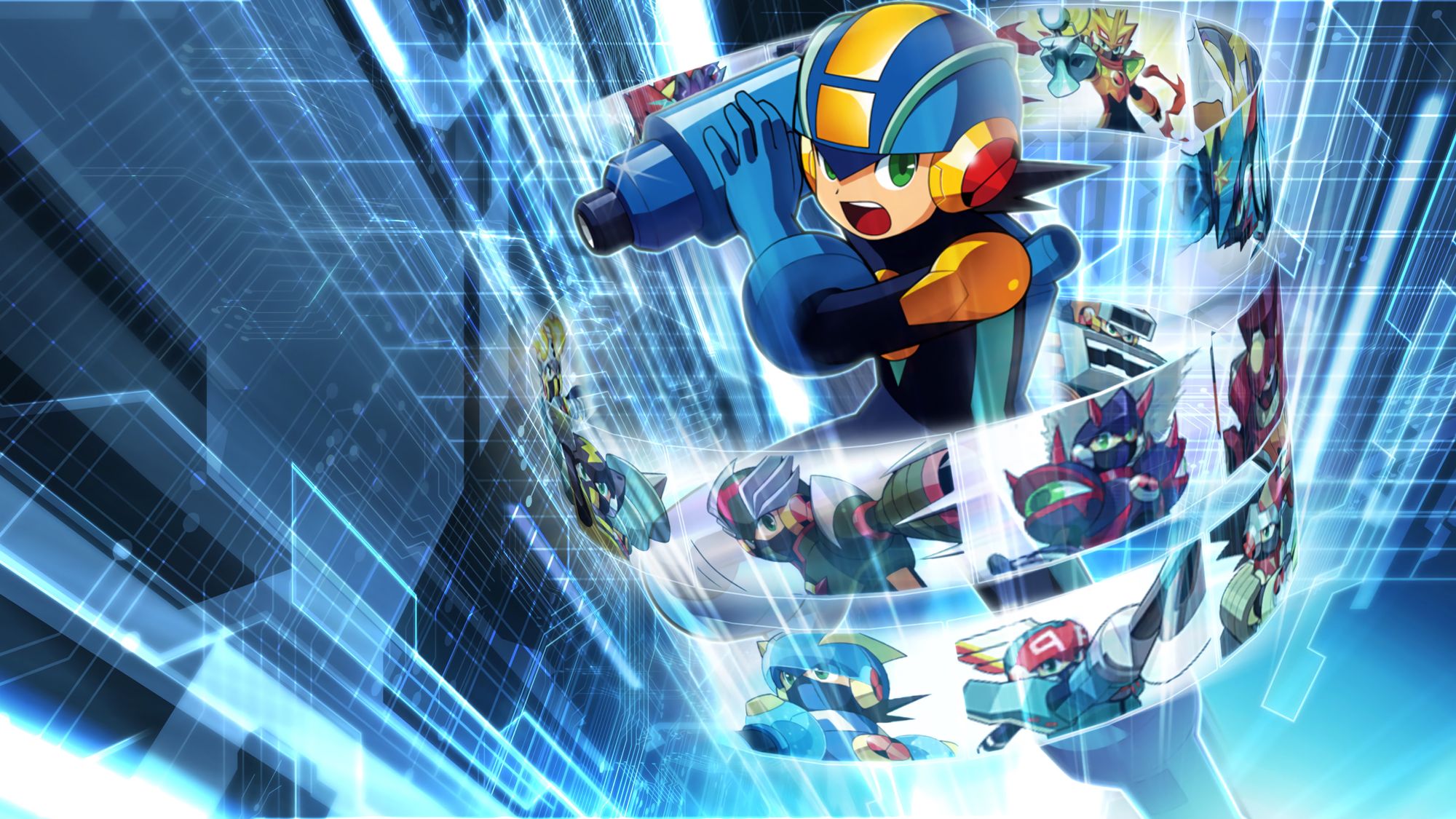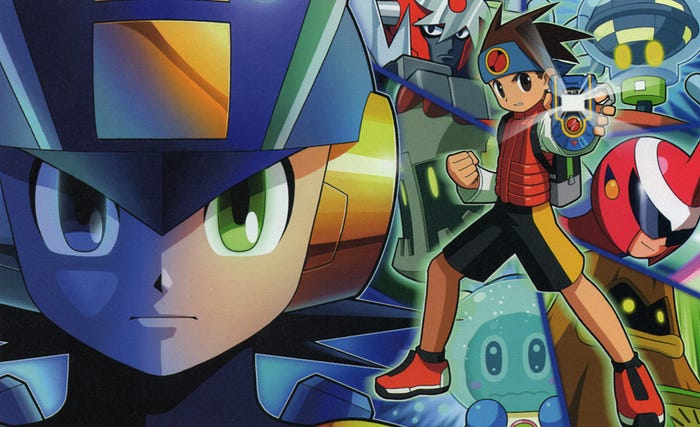Mega Man Battle Network’s Optimistic Futurism
The Net of 20XX made me hope for an impossible world

In the year 1999, when I was eleven years old, my parents decided take us on a good old-fashioned road trip to visit extended family in the rural expanses of Idaho. This was the year I would receive my first Game Boy Color. It was the year of Columbine and Spongebob Squarepants. While we were still more than a year away from the devastating global implications of September 11, the world was undoubtedly changing around me. As my parents drove us toward my grandparents’ house for New Years Eve, they were unwittingly transporting us into a frightening future.
It was there, my young self only tangentially aware of the Internet, that we passed from one century to the next.
Cyber Terror
Despite it being over twenty years ago now, I remember the very real panic that washed over the populace of America in the wake of the coming “Y2K,” a decidedly apocalyptic event purported to short out all computers worldwide and cause mass panic the second the clock struck midnight.
Everyone predicted global damage. In a world becoming increasingly reliant on computers, everything from alarm clocks to banking accounts would be affected. While this cyber catastrophe never came to pass, the lingering panic would rear its head again and again as the twenty-first century curated a society that could never again peel itself from the needs of the computer. From data breaches to credit card leaks to the Dark Web, the twenty-first century brought with it a very real terror, one where any minor inconvenience in cyberspace could have far-reaching and devastating effects.
The Y2K bug passed into obscurity, and looking back it feels like nothing more than overhyped panic. Americans stocked up on food and water and prepared for the worst. Y2K largely became known as a hoax because the people that worked tirelessly to prevent it, prevented it.
An Alternative Future
In 2001, Capcom released the first Mega Man Battle Network entry for the Game Boy Advance, a game that would spawn a long-running spinoff series of games for the GBA, Nintendo DS, GameCube, and more. While the Mega Man series has long envisioned a future where society relies on the necessity of robots to do everything from household chores to handling public infrastructure, Battle Network imagined a parallel future where the Internet reigned king. Not so different from the world we live in, Battle Network takes place in the vague year “20XX” where people use PETs (PErsonal Information Terminals) to interface with the Internet, a variation of smartphones that would become the norm nearly ten years later.
Battle Network’s vision of the world is one where the Internet is the soul of technology, existing in everything from ovens to buses to zoo cages to blackboards (horrifying, right? Who could imagine). While this dream utopia of interconnected beneficial networks is shiny and chrome, it is not without its constant attacks. Terrorists abound in the world of Mega Man Battle Network, terrorists whose plans stretch from petty thieving to global control. In Battle Network, the world is striving toward a unified and optimistic future, one where the “Net” as they call it is a force for absolute good.
Where this future divides a bit from our own is in its advanced and fictionalized technology. The Net is actually more (much more, as established in the later games) than the Internet as we know it, and PETs are much more than our silly smartphones could ever dream of being. Instead of simple internet access devices, PETs house their own stylized and customizable AIs. These intelligences (known as NetNavis) reflect the whims of their users, though they also have personalities of their own.
Designed to navigate a network that’s too complex for humans to understand, Net Navis are used to physically explore virtual spaces via a concept the games refer to as “jacking in.” While Mega Man Battle Network attempted to future-proof its prophetic vision, it could not predict the advent of social media, instead relying on message boards and emails as the surrounding technology advanced. Its vision of the future was shared by CyberConnect2’s .hack games, where the Internet remains a stage for subterfuge and sabotage.

“Jack in!! Mega Man, Execute!”
Lan Hikari, the game’s prepubescent protagonist, is the operator of one such Navi named Mega Man. His father Dr. Yuichiro Hikari (Dr. Light for the Mega Man fans) is one of the world’s foremost Net scientists and researchers, a man of nearly unparalleled genius who is helping to unify the cyber world and the real world. As operator and Navi, Lan and Mega Man do more than simply peruse the Net and hang out with their friends — they are virus busters of some renown, a pair who stop the threat of cyber terrorism again and again. Since Navis are complex artificial intelligences, their emotional bond with their operator affects their output in battle. Lan and Mega Man share a bond deep as blood.
The battles that Lan fights throughout the Battle Network games are typically against evildoers who wish to damage the Net in some way. The nefarious Dr. Wily of WWW (World Three) wants to create the Life Virus and destroy the Net as revenge against a government who defunded his robotics research. Other villains throughout the series attack the Net out of malice or jealousy, hoping for attention they could not find elsewhere in their lives. Every time Lan has Mega Man “jack in” to this creative cyberspace where he must battle viruses and other Navis for the sake of the future, utilizing his arsenal of programmed battle chips to reduce his foes to so much data.
There is a charm that exists in Mega Man Battle Network that reaches beyond its cutesy aesthetic and wholesome characters. The terror in this time period of 20XX is almost entirely one-sided, where the villains are simple agents of chaos and the heroes are people who wish to make the world a better place. The world of Battle Network feels more than a “What If” scenario of Mega Man; Battle Network asks, What would our society look like if we spent our time, money, and energy simply making the world a better place?
Imagining A Brighter Future
While many might argue the case, our real world is not one of optimization. Capitalism is a terrifying yoke that burdens society and cripples everything from food to infrastructure to the environment. The distribution of resources in America is so lopsided that it’s darkly comical, and instead of pursuing ultra-fast light rails we spend millions on single-person electric cars and improved freeways. Our society is one of selfish exploitation, and the laws we craft fly in the face of science and humanism. The Internet isn’t curated for knowledge or substance, it is a freeform wonderland of blatant idiocy and misinformation. To put our post-Y2K society in a fiction novel thirty years ago would be to craft a place so absurd that it might be saved by the likes of Tom Cruise or Arnold Schwarzenegger, and yet we perform our daily routine tasks in the face of a rapidly disintegrating way of life.
In Battle Network, there is a through-line of socialist thought and humanist need in this constructed utopia. Lan and his friends can hop on any bus and air trolley for free. They can run up and down the street at any time of night. If pressed by a villain, the answer is almost always to defend themselves with the power of the Internet (their NetNavis and PETs, of course). Similar to the sort of utopia imagined in the Pokémon games (another adjacent world filled with such unbelievable things as free healthcare), Battle Network forges a society that seems to want the ultimate good.
Similar to our world, ruling the Internet in Battle Network would mean owning the globe. While my adult self wonders why the salvation of the entire Net often fell on the shoulders of a ten-year-old, the younger me that obsessively played the Battle Network series engaged in full suspension of disbelief. This future imagined by Battle Network just made sense. Why would we not strive for a world where our ovens temps could be set by the Internet? Why would I not want to live in a place where the care provided by a hospital could be magnified by the power of cyberspace? Any issue that ever came up in the Battle Network games could be easily resolved by a couple fun fights and the power of friendship. This utopia’s only enemy were those who despised the cooperative nature of the Net itself.
As a young person playing Battle Network, I believed in this optimistic future where the Internet was an inarguable good to be defended at any cost. Part of me still believes this. While the future imagined in Mega Man Battle Network might seem a bit simplistic and contrived compared to the one we now inhabit, its version of our Internet-connected daily lives is charming in that simplicity.
Fixing our problems may not be as easy as telling Mega Man which battle chip to use, but the utopia that unifies science and nature in Mega Man Battle Network deserves to be more than a fictional anecdote. The future that Lan and Mega Man fought for should be the one we fight for, too.
As always:
Fight, Mega Man!
For everlasting peace!
